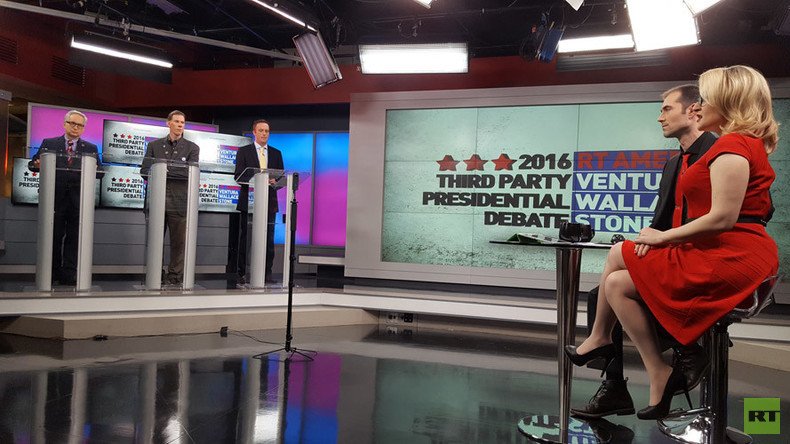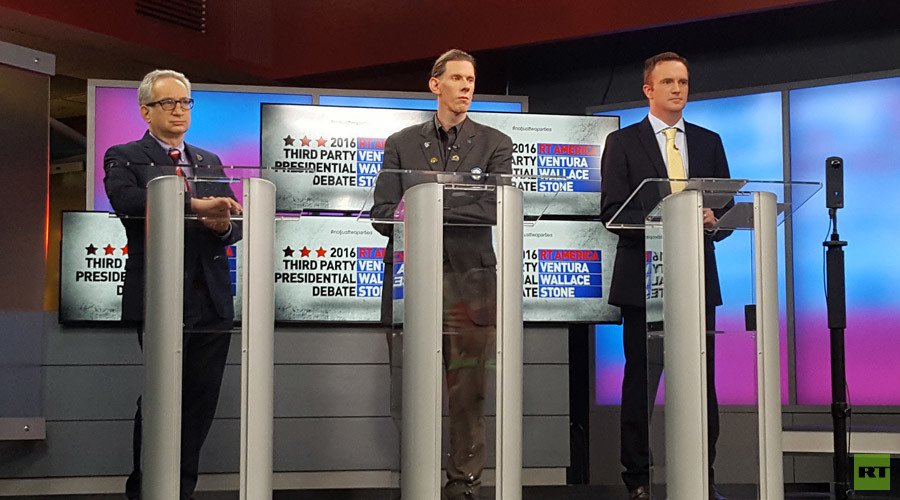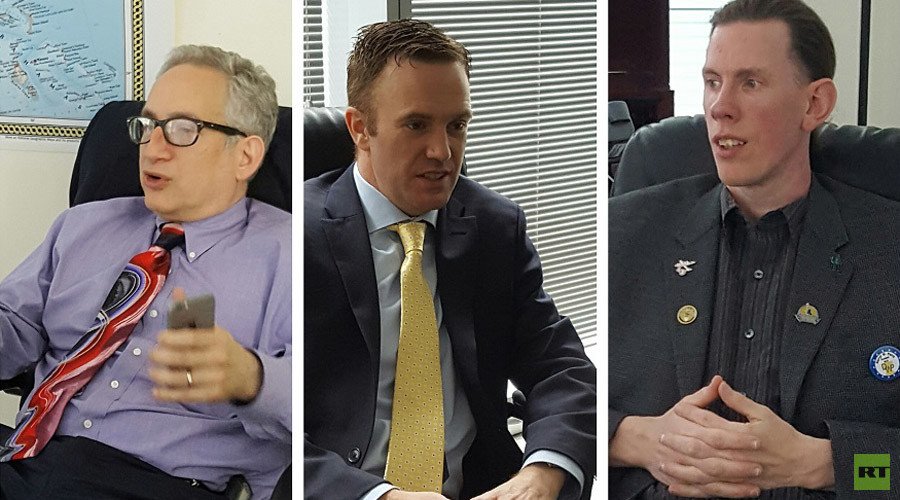Against ‘government at gunpoint’: Libertarian candidates debate on RT America

From abolishing most government in favor of free markets and personal responsibility to ending foreign wars and pardoning whistleblowers, three Libertarian Party presidential candidates presented their vision for the US in a debate hosted by RT America.
Marc Feldman, Kevin McCormick, and Darryl Perry faced each other before RT America’s 360-degree camera, in a debate moderated by Watching The Hawks co-hosts Tyrel Ventura and Tabetha Wallace.
The Libertarian Party is the third-largest political party in the United States, behind only the Democratic and Republican parties. Its platform favors civil liberties, small government, free markets and a non-interventionist foreign policy.
“I’m a physician, not a politician,” Feldman said in his opening statement, noting that he was an “informed non-voter” for years before deciding he could not support either major party.
“We absolutely are not centrist,” said Perry, adding he represented the “libertarian wing of the Libertarian Party.” He articulated the movement’s ideology as “self-ownership” and described taxation as “theft, armed robbery and extortion.”
Major parties don’t represent the average American, McCormick argued, adding that officials are “crushing our economy” under the weight of unaccountable bureaucracy, instead of debating the issues.
DOMESTIC ISSUES
In the first bloc of the debate, the candidates answered questions about bank bailouts and trade, food waste and social security nets, and libertarian notions of government.
“The answer is always empowering the individual,” Feldman said, describing the US as “an oligarchy, run by special interests and corporations.”
“An actual free trade document can be written on a 3x5 index card,” not massive 1000-page documents that regulate things under the guise of free trade, Perry said.
US repatriation tax is 35 percent – the highest in the world: “We need to eliminate this tax and bring that money home,” McCormick said.
Bailouts
On the subject of big bank bailouts, Perry argued that the bad loans were made at the direction of the government. “Federal government was incentivizing bad behavior,” he said.
McCormick agreed. “If I don’t punish my dog for going to the bathroom in the house, he will keep going to the bathroom in the house,” he said, adding the issue should be handled by bankruptcy courts, not bailouts.
Feldman compared bailouts to feeding a gambling addiction at a casino.
Food waste
“I would get the government out of the equation,” McCormick said, on the subject of food waste. “Let the free market do its job.” He blamed the governmentfor creating the problem with regulations.
I'd do nothing to help w/ food waste. I'd stop subsidizing farmers - @KMcCormick2016#notjusttwopartiespic.twitter.com/HfVSxMLhzy
— RT America (@RT_America) May 12, 2016
Government programs destroy crops to manipulate price, Perry argued, saying, “If you just remove the government manipulation… you would wind up having a lot less wasted food."
Feldman criticized the “high-calorie, low-fiber addictive food” marketed to the public, “and it’s toxic.”
Social safety nets
Feldman called his platform a “Balance and credit program," saying he would balance the budget while changing all charitable tax deductions to dollar-for-dollar tax credits. He would “de-socialize” the social safety nets and make them private and voluntary.
Libertarian candidate for president Marc Allan Feldman gives his alternative to a social safety net @VotesNotForSalepic.twitter.com/UcLyJ5yTca
— RT America (@RT_America) May 12, 2016
Private care organizations do so more efficiently than government, Perry agreed, pointing out that the government was not involved in social security until about 85 years ago.
“I do not have the power to cut these programs, they are controlled by Congress,” McCormick said, adding that they would be de-funded by balancing the budget.
Abolishing the IRS
“I don’t think it’s a realistic first step” to abolish the IRS, McCormick said. “I know there is a recession coming,” and there is $3 trillion trapped outside the US. He wants companies to bring their money home, to create jobs, invest in infrastructure, or give it back to shareholders.
“First step is to balance the budget,” by cutting support for special interest groups supporting both major parties, Feldman argued.
'I don't believe anything should be funded coercively' - @DarrylWPerrypic.twitter.com/Epi6INjKIZ
— RT America (@RT_America) May 12, 2016
“Absolutely no good or service should be provided at the barrel of a gun,” Perry said. “If people want NASA to exist, then write a check to NASA.”
Alternative currencies
“I do believe that crypto-currencies are the wave of the future,” Perry said. “I am not taking federal reserve notes as campaign contributions,” only dealing with bitcoin and precious metals. “Governments shouldn’t have anything to do with the currency at all.”
Alternative currencies are “a wonderful example of the free market at work,” McCormick said. “Allow the American public to choose how they want to transact business.”
“Money is an agreement, a bit of trust,” Feldman said. More currencies add choice, while “risk comes from concentrated power.”
How about a Libertarian utopia?
“We didn’t get to this disaster overnight,” McCormick said. “To unwind this is going to take decades.”
When the world doesn’t end as reforms take place, people will see the government is not really needed, he said.
“Few libertarians see a perfect world being with no government,” Feldman said, describing himself as an agnostic about how much government there ought to be.
“I’m a big advocate of polycentric civilizations,” with government not tied to geography, Perry said, with people having as much government as they want.

FOREIGN POLICY
Should the US intervene abroad, and when?
“We don’t want to be North Korea,” Feldman said, saying the US should use culture, tourism and values to interact with the world, not bombs. Locking the front door doesn’t make one safe, having understanding neighbors does.
“Never, unless there is an actual invasion of the US,” Perry said, adding the defense would be funded privately.
“We should always look to diplomacy first,” McCormick said. “I am not an isolationist, but we need to change our tactics.”
Foreign aid
“Everyone cries when you take away the credit card,” Perry said, but he would cut all foreign aid anyway.
Aid to Israel mostly subsidizes US military industry, Feldman said, arguing that “Israel really doesn’t want the money.”
Most US foreign aid is military aid, but the world needs economic aid, McCormick said. “Until we can grow their economies, there will never be a real solution.”
What about US troops abroad?
“We need to reduce our military presence around the world,” McCormick said. When Russian jets buzzed US ships, left out of the reports was that “we’re sitting out there, off the coast of Russia.” US needs to be focused on diplomacy, he added.
“I would support our troops by bringing them home,” Feldman said, describing the current situation in the US as no different than a foreign military occupation.
“I believe the number [of US military bases around the world] should be zero,” Perry said.
Drone wars
“How many people feel safer today? Not many,” Feldman said. Medication is tested and monitored for being both safe and effective. Not so with government
“They should be stopped immediately,” Perry said, citing recent reports that 90 percent of people killed in drone strikes were civilians.
“These drone strikes are catching innocent civilians,” McCormick said. It would be much more effective to broadcast information or free Wi-Fi.
US out of UN?
That is a founding libertarian principle, Perry said. “The UN does not actually do what it was supposedly created to do, and has become a decider of who gets to bomb people.”
“No, but we have to stop being the checkbook for every country,” McCormick said. “I’m not here to solve the world’s problems.”
“UN is kind of like Facebook,” Feldman said, letting the US know who its friends – and enemies – are.
Iraq and Afghanistan
“Our initial response was not wrong,” but the follow-up response was, McCormick said, bringing up the example of US-trained rebels in Afghanistan that turned into terrorists.
“It was actually the wrong response,” Perry said. The actual guilty party, the 19 hijackers, died on 9/11. “It was not the government of Iraq, or Afghanistan” that was to blame. If anything, Saudi Arabia needs to be asked about 15 out of the 19 being its citizens.
“A country is not responsible for terrorism, terrorists are,” Feldman said. “It’s not a war, it’s a crime.”
Fighting terrorism
“Fear is a very powerful emotion,” Feldman said. “What we should be fearing is loss of control” by individuals, and takeover by special interests.
"This is like a drunken barfight… only with drone bombs and missiles,” Perry said. The way to win is to not be afraid.
More people are killed by bears than terror. Winning global war against it means not being afraid - @DarrylWPerrypic.twitter.com/MlFUCwqs9K
— RT America (@RT_America) May 12, 2016
“We have been misled by lobbyists and misinformation,” McCormick said. The real threat is hackers and cyber-attacks. “Our infrastructure is at risk.”
THE 2016 CAMPAIGN TRAIL
Voting reform
“Our government doesn’t represent us, and the basic problem comes down to the American voter. You have to vote!” Feldman said, noting that in 2012, almost 100 million people didn’t vote because they felt they had no choice.
“I don’t think it’s the job of the president to try to restore people’s fate in the voting system," Perry said. "Democracy is not what people think it is. Democracy is where a plurality of people on a given day make decisions that affect the majority.”
“The federal government has no role in this,” McCormick said. The Republican and Democratic parties made the voting rules, while Libertarians have to fight every step of the way just to be heard.
Campaign finance
The current system that violates constitutional rights should be abolished, along with taxpayer funding for Democrats and Republicans, Perry said.
“We don’t need to reform the campaign finance system, we need to take back our public broadcast systems,” McCormick said.
“Racism doesn’t win elections any more, not because racism was made illegal, but because people stopped voting for it,” Feldman said, arguing that finance is not the problem, attitudes are.
Abolishing 'Citizens United'
“The problem is not the money, the problem is access to the public airways and the media,” McCormick said. Libertarian party will be on the ballot in every state, but nobody has heard of it because all the media cover mainstream candidates like Donald Trump “drone on about the dumbest things in the world.”
Media focuses on 'Trump droning on while there's a real party that wants to talk about the issues' - @KMcCormick2016pic.twitter.com/kmH6A0zpbH
— RT America (@RT_America) May 12, 2016
Americans don’t understand what Citizens United was about at all, Perry said, pointing out that the verdict came out of a group being denied the right to make a movie the regulators termed political.
“Citizens United is not the problem, the problem is how people vote,” Feldman said. “Dollars don’t vote, and votes are not for sale.”
Winning over independents
“There are very few truly independent independents,” Feldman said. Would launch a campaign to register voters across the country, “Staying home is not an option anymore.”
“We need to get out and work on voter access,” Perry said, but that is not good enough to get them to like the ideas.
McCormick blamed Republican and Democratic "brainwashing” that voting for a third-party is a wasted vote. "When did they start to own my vote?" he asked, protesting that the duopoly has resulted in “two of the worst candidates in the history of the US.”
What about false libertarians?
“Unless you actually understand what libertarianism is, I don’t think you can rightly claim to be a libertarian,” Perry said, explaining that good intentions don’t trump self-ownership, or justify violence and theft.
“Follow the money and you’ll know what people do,” Feldman said.
“Republicans and Democrats lie to you,” said McCormick said. “You don’t need to change the Republican Party. Your voice and your vote represent your ideas.” He urged Americans to vote for the party they actually side with, “instead of the lesser of two evils.”
TOWN HALL
In the Town Hall segment, moderated by Watching The Hawks co-host Sean Stone, the candidates were asked questions collected through social media.
One of the questions directed at all three was whether they would pardon the NSA whistleblower Edward Snowden.
“Technically the President cannot pardon [Snowden], he hasn’t been charged with anything,” Perry said, adding that his first three things he would do as president would be pardons for Chelsea Manning, Silk Road founder Ross Ulbricht, and Snowden.
'Should be the right of every American to take in as many refugees they can support' - @VotesNotForSalepic.twitter.com/A4FNhQhYsX
— RT America (@RT_America) May 12, 2016
“I believe Ed Snowden was a traitor to the government, but not to the people, of the United States,” Feldman replied. He would have Snowden put on trial; pardon him if convicted, and appoint him to his Cabinet.
'We're talking about 16 million people in the second half of 2015 touched by illegal gov't search' - @KMcCormick2016pic.twitter.com/pEmwn3JAni
— RT America (@RT_America) May 12, 2016
Former Representative Ron Paul asked the candidates if they would end the Federal Reserve.
“We need to start step by step,” McCormick replied, arguing that the Fed has to manipulate monetary policy because Congress is not taking care of the fiscal policy.
“I would be happy with declawing the Fed” through tax reforms, saidFeldman, adding he was not sure that the president had the power to abolish the private central bank.
Perry called the Federal Reserve "a giant tumor on the economy of the USA,” and went a step further arguing for a repeal of legal tender laws altogether.
A Twitter question directed to Perry specifically asked him what government agencies he would abolish if elected.
“I want to get rid of everything that’s related to the federal government, including the federal government” itself, Perry answered. "The US government is the world’s largest terrorist organization, and we need to get rid of it.”
I'd get rid of the entire federal gov't. It's the world's largest terrorist org. - @DarrylWPerry#notjusttwopartiespic.twitter.com/Xcf3mq5JIt
— RT America (@RT_America) May 12, 2016
One viewer asked if the candidates supported equality for all, or statehood for the District of Columbia.
“We need to hear everyone’s voice. Free speech doesn’t mean you only get to hear nice things from people,” McCormick said. He would return federally owned lands to the states, while DC should be a state if it so wants.
“Each person should have sovereignty over what they do,” so long as they don’t infringe upon others, Feldman said – including taking in as many refugees as they can support, for example.
Perry said he would “retrocede all the DC population to Maryland," leaving only federal buildings and museums in the "District of Criminals.”
CLOSING STATEMENTS
Government has gone on a spending spree, launched mass surveillance, and stripped millions of their liberties, McCormick said in his closing remarks.
Democrats and Republicans have lied, promising many things and delivering none. Mainstream parties have produced “two of the most disliked candidates in the history of US politics.”
“The American people are ready to hear someone promote the ideal of liberty consistently, on every question,” Perry said. He illustrated his policy stance by arguing that “every substance should be as legal as tomatoes,” including cannabis.
“I don’t want a government that asks for permits and licenses for things that are none of its business,” Feldman said, adding that his “intersectional libertarianism” would empower every individual, not just the wealthy and intellectuals.

About the Candidates
Darryl W. Perry is an author, editor and radio host who co-chairs the New Hampshire Liberty Party. He hopes to “run the most libertarian presidential campaign in history.”
Kevin McCormick is an IT security expert and longtime member of the Libertarian Party who feels “trapped by a two-party system.” His platform rests on three non-negotiable principles: personal freedom, free speech and the right to privacy.
Marc Allan Feldman is a physician who practiced anesthesiology at Johns Hopkins for 11 years. He takes a hardline stance on campaign finance, explicitly refusing to court wealthy donors, and supports limiting the government’s eminent domain powers.












